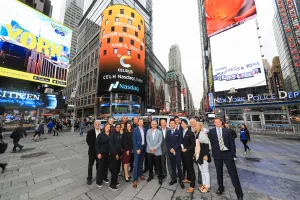It was the early winter of 1993, and Loren Israelsen was in my windowless office at GNC’s Pittsburgh headquarters giving me an update. “It’s not going to happen this year,” he said.
We had just spent the year trying to get legislation passed that would proactively clarify the legal status for a new category now called dietary supplements. The 1993 congressional session was ending without bringing the legislation to the floor.
The U.S. Food and Drug Administration had been working to create its own criteria for dietary supplements since the passage of the Nutrition Labeling and Education Act (NLEA) of 1990. Under FDA’s approach, amino acids, botanicals, and even vitamins and minerals over the RDA (recommended dietary allowance) levels could be effectively banned from the market. It was an existential issue for our industry, and we had to act.
While the setback in 1993 was disappointing, there was reason to be hopeful. The lobbying and regulatory framework preparation ground game we had established set the stage for a potential success in 1994. It was going to cost a lot more money to fund the lobbying, drafting and consumer communications efforts, but it would be worth it to have regulatory clarity around a business segment that had — and still has today — so much potential to change health for the better.
Vitamins, minerals, amino acids and botanicals stood in a no-man’s land between food and drugs — with no proof of efficacy standards, no clear manufacturing standards, and no safe way to make even the most innocent of label claims without risking enforcement action. If this industry was ever going to reach its full potential, we needed to have clear laws, and soon!
Loren and I talked about the 1994 campaign, and it was clear that we needed to double down on our lobbying and negotiation efforts, especially with key U.S. senators who supported our cause: Orrin Hatch of Utah and Tom Harkin of Iowa. This was still an era when the two sides of the political aisle could actually discuss and agree on some things. Hatch was our Republican and Harkin was our Democratic lead for the legislation.
Crucially, we also needed some serious marketing firepower to mobilize consumer action. Something to put pressure on Congress to act in 1994 as they had not done in 1993. That’s when the Save Our Supplements (SOS) campaign was born.
The idea was simple, namely create the largest letter-writing campaign to Congress since the Vietnam War. The message: Supplements were helping millions of people maintain their health every day and how dare the FDA try to deny consumers this right. SOS was a first-of-its-kind national grassroots campaign to create groundswell action for our industry from consumers shopping in the specialty retail and natural food store channels of distribution (the only two meaningful channels at the time for supplements).
As the only company with the scale and resources at the time to pull this off, GNC conceived, funded (along with just about half of the multimillion-dollar total industry effort to pass the Dietary Supplement Health and Education Act of 1994 [DSHEA]) and executed this integrated program.
We printed freestanding letter-writing stations that could be folded from cardboard into small desks in the store. We provided a pre-printed form letter, so that consumers just had to sign them. We shipped these kits to both GNC stores and independent food stores, who otherwise viewed us as a dreaded competitor. We monitored our own store employees to ensure they were telling every customer that we must have letters flowing in to have an impact on Capitol Hill.
In the end, the SOS campaign generated about 2.5 million letters to Congress in an age before internet or email communications.
The following year was a success, with the passage of DSHEA, which still defines and governs the regulatory framework for the dietary supplement industry. We did not get everything that we wanted. We wanted stronger claims beyond limited structure-function statements and a category for herbal medicines modeled on the approach in some European countries.
However, the compromise legislation allowed supplements to make limited claims, to be sold legally, and set the stage for consumer branding and innovation that continues to this day. DSHEA has powered the U.S. dietary supplements industry in 2024 to become more than six times the size it was in 1994.
The success of DSHEA had many fathers and mothers: The skilled lawyers, lobbyists and policy influencers coordinated by the indefatigable Loren Israelsen, president of the United Natural Products Alliance (UNPA); the impassioned GNC and natural foods store owners who generated one of the largest letter-writing campaigns in the history of our country; the VMS (vitamins, minerals and supplements) manufacturers who chipped in time, money and best-practices manufacturing standards to the effort; and the 2.5 million consumers who had their voice heard.
The passage of DSHEA was a rare moment in our industry when we had to act together as an industry, and we did just that.
DSHEA is not perfect, but it avoided a potentially fatal death spiral for the VMS industry. The risks of downsides and unintended consequences from tinkering with regulatory frameworks are a key issue in current discussions of a revised “DSHEA 2.0” and are worth considering on a risk/benefit basis as DSHEA enters its fourth decade.
Happy birthday DSHEA!
References:
2.5 Million Letters to Congress:
$11.8B US VMS Industry in 1997
Dietary Supplements Regulatory History



